Robert College
The Robert College of Istanbul (Turkish: İstanbul Özel Amerikan Robert Lisesi or Robert Kolej, often abbreviated to RC) is an independent high school in Turkey.[1][2] The co-educational boarding school is situated in a 65-acre (26 ha) wooded campus on the European side of Istanbul in the Beşiktaş district, with the historic Arnavutköy neighborhood to the east, and the upscale Ulus neighborhood to the west.
| Robert College Robert Kolej | |
|---|---|
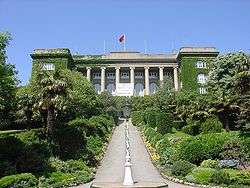 | |
| Address | |
| Information | |
| Type | Independent, day & boarding |
| Established | 1863 |
| Founder | Christopher Robert and Cyrus Hamlin |
| CEEB code | 696220 |
| Headmaster | Adam Oliver & Nilhan Çetinyamaç |
| Grades | Prep, 9–12 |
| Gender | Co-educational |
| Enrollment | 1045 190 boarding 276 on scholarship |
| Language | English Turkish |
| Campus size | 65 acres / 27 ha |
| Campus type | Urban |
| Houses | Gould Hall, Mitchell Hall, Woods Hall, Sage Hall, Bingham Hall, Feyyaz Berker Hall, Suna Kıraç Hall, Nejat Eczacıbaşı Hall |
| Student Union/Association | Robert College Student Council |
| Color(s) | |
| Mascot | Bobcat |
| Team name | Bobcats |
| Accreditation | NYSAIS |
| Newspaper | Bosphorus Chronicle |
| Yearbook | Record |
| Website | www |
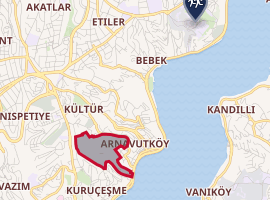
| |
The 154-year-old institution is arguably the oldest American school still in existence in its original location outside the United States.[3] Robert College is accredited by the New York State Association of Independent Schools.
Robert College has a long list of notable alumni, including entrepreneurs, politicians, journalists, artists, two Turkish Prime Ministers, two Bulgarian Prime Ministers,[4] multiple members of the Turkish cabinet, and one Nobel Prize recipient, Orhan Pamuk. The school is a member of the G30 Schools group.
History
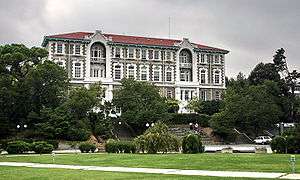
In 1863, Robert College was founded in Bebek by Christopher Robert, a wealthy American philanthropist, and Cyrus Hamlin, a missionary devoted to education. Six years after its foundation, with the permission (Ottoman Turkish: irade) of the Ottoman Sultan, the first campus (currently housing Boğaziçi University) was built in Bebek at the ridge of the Rumelian Castle, very close to a Bektashi tekke, whose leaders maintained an excellent relationship with the Congregational and Presbyterian founders of Robert College, according to Dr. Friedrich Schrader, a German lecturer at Robert College during the 1890s.[5] The first building of the school was named "Hamlin Hall" in memory of Cyrus Hamlin. In 1878, Christopher Robert died. According to the article A Millionaire's Will, published in the New York Times (November 27, 1878), Robert left a great portion of his wealth to the College.[6]
A College Catalog was compiled in 1878–1879, giving general information and an outline of the courses of study. Defining the aims of the College the catalog stated: "The object of the College is to give to its students, without distinction of race or religion, a thorough educational equal in all respects to that obtained at a first-class American college and based upon the same general principles."
After Hamlin, Robert College was administrated by George Washburn (1877–1903)[7] and Caleb Gates (1903–1932). Though founded at the time of the Ottoman Empire as an institution of higher learning serving the Christian minorities of the Empire as well as foreigners living in Constantinople, the school adopted a strictly secular educational model in accordance with the republican principles of Turkey in 1923. Robert College, at various points of its existence, had junior high school, high school, and university sections under the names Robert Academy, Robert Yüksek and American College for Girls. Since 1971, the current-day Robert College has functioned only as a "high school"[8] (more comparable to the French lycée in academic rigor) on its Arnavutköy campus (formerly the campus of American College for Girls), yet it retains the title of 'College'. The Bebek campus and academic staff were turned over to the Republic of Turkey for use as a public university named Boğaziçi University, the renamed continuation of Robert College's university section.
Major events
- 1863, September 16: Robert College opened with 31 students at Bebek Seminary School.
- 1922: President C. Gates and Hüseyin Pektaş (the first Muslim graduate and then Vice-President of the college) attended the Conference of Lausanne representing foreign educational institutions in the Ottoman Empire.
- 1932: With Dr. Paul Monroe, the joint Presidency system was adopted by Robert College (RC) and the American College for Girls (ACG). Robert Academy was the preparatory school for Robert College, which had a reputable Engineering School. Instruction was bilingual, in Turkish and English. Graduates of ACG are considered ACG Alumni, not RC Alumni.
- 1957: Robert College was granted permission to become an institution of higher learning by the Republic of Turkey; Robert College Yüksek provided university-level instruction and is the precursor of the current Boğaziçi University. Robert Academy remained on the Bebek campus as a private high school.
- 1971: Robert College Yüksek officially closed on 18 May and was renamed Boğaziçi University. The merger of the American College for Girls and Robert Academy as a co-educational private institution with junior high and high schools, on the Arnavutköy campus was officially confirmed on September 1971. Robert College's Bebek campus was donated to the Republic of Turkey. Boğaziçi University was established as a public university on this land.
- 1998: With the adoption of a law calling for eight years of uninterrupted primary education in Turkey (junior high school would now be a part of primary education), the school stopped accepting students to its junior high school section.
- 2004: The last junior high school students graduated and the school's junior high school section was officially closed. Now, Robert College has Prep, 9th, 10th, 11th, 12th grades, and accepts students who have finished compulsory primary education of eight years.[9]
"Robert College stands as a token of the close cooperation between Turkey and the USA. It is an institution which has made important contributions to the cultural life of this country and will continue to play a valuable part in the promotion of culture and education."
— Cemal Gürsel, President of the Republic of Turkey, Message for the Centennial Celebrations of Robert College, 1963[10]
List of presidents and heads
- Cyrus Hamlin, 1863–1877
- George Washburn, 1877–1903
- Caleb Frank Gates, 1903–1932
- Paul Monroe, 1932–1935
- Walter Livingston Wright, 1935–1943
- Harold Lorain Scott (Acting President), 1943–1944
- Floyd Henson Black, 1944–1955
- Duncan Smith Ballantine, 1955–1961
- Harold Locke Hazen (Acting President), 1961
- Patrick Murphy Malin, 1962–1964
- James L. Brainerd (Acting President), 1965
- Dwight James Simpson, 1965–1967
- Howard P. Hall (Acting President), 1967–1968
- John Scott Everton, 1968–1971
- John Clay Chalfant, 1971–1977
- James Richard Maggart, 1977–1981
- Elizabeth Dabanovitch (Acting Head), 1981–1982
- Alan Donn Kesselheim, 1982–1984
- Margaret A. Johnson (Interim Head), 1984–1988
- Harry A. Dawe, 1988–1992
- Benjamin D. Williams III (Interim Head), 1992–1993
- Christopher Wadsworth, 1993–2001
- Livingston Merchant, 2001–2005
- John Russell Chandler, 2005–2012
- Anthony Jones, 2012–2015
- Charles H. Skipper, 2015–2019
- Adam Oliver, 2019–Present
"I have come to express America's solidarity with the Turkish people at a time of national tragedy, and to reaffirm our partnership for a common future. We have been friends for a very long time. In 1863, the first American college outside the United States, Robert College, opened its doors to the youth of Turkey. It was the only foreign institution allowed along the Bosphorus, precisely because America had never encroached upon Turkish sovereignty. I'm very proud that Prime Minister Ecevit is an alumnus of Robert College."
— Bill Clinton, President of the United States, From his speech delivered to Turkey's parliament during his visit in November 1999, after the devastating earthquake in western Turkey on August 17, 1999[10]
Academics
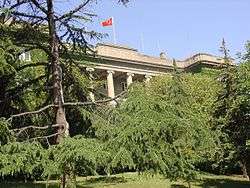
As of 1999, as per Turkish Ministry of Education regulations, Turkish is the instructional language of history and social studies classes.[11]
Students
Robert College accepts 180 to 220 students each year, who have scored within the top 0.2 percentile in a nationwide examination, which every Turkish student must take in order to study in a high school (secondary education) after they complete their primary education. The school has around 1000 students each academic year.
In the 1998–1999 academic year there were 942 students, with 99% having Turkish nationality.[12]
Circa 1904, the school had about 300 students, with boarding space for about 200. Lucy Mary Jane Garnett wrote in the 1904 work Turkish Life in Town and Country that at that time most of the students were Christian as the college had a requirement for students to attend Christian Sunday church services and chapel services, and "it would be unsafe for any professed Moslem to become either a resident or a daily student" since the Ottoman government would take a dim view of a Muslim going to chapel. In 1904, Greek students made up the majority and other students included significant numbers of Armenians and Bulgarians.[13]
Faculty and staff
The faculty have an average of 20 years of teaching experience and the majority have either Turkish or United States citizenship. The school currently has faculty who are 50% Turkish, and 48% English native speakers (including faculty from English speaking countries other than the United States). Sixty percent of the full-time faculty hold master's degrees or higher.[14]
As of 1999 there were 102 teachers, with 45% being Turkish and 32% being American. Of the teachers, eight were part-time.[12] The school's guidance counselors, as of that year, were English-speaking Turkish citizens.[11]
As of 1999, as per Turkish Ministry of Education regulations, the school employs only Turkish citizens to teach history and social studies classes.[11]
As of 1999, the school pays its foreign employees funds so that their children may attend Istanbul International Community School, If an employee chooses another school, Robert College will pay an equivalent amount.[15]
In 1904, faculty included Americans, Turks, Armenians, Bulgarians, and Greeks.[13]
Curriculum
Robert College is a five-year high school, with the first year (Prep) being the English immersion year that prepares students for rigorous curriculum, which is mostly in English. English is the language of instruction used in Science, Mathematics, Literature, Physical Education, Art and Music courses. Turkish is the required language of instruction in social sciences and Turkish language/literature.
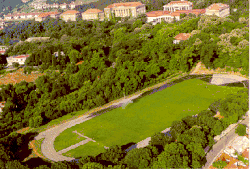
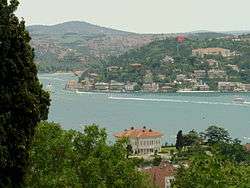
Higher education
Robert College graduates traditionally continue their education in the United States or Turkey, though in recent years the number of students studying in Canada and the United Kingdom increased. Every year approximately 50–60 percent of the graduating class choose to study abroad, while those wishing to study in Turkey get placed in a university based on their score on the Core Proficiency Test-Advanced Proficiency Test (TYT-AYT). In 2006, Robert College ranked first in all three sections of ÖSS, a formerly-administered Student Selection and Placement System test, among private high schools in Turkey, with 76 out of 132 students taking the exam scoring in the top 0.3% (top 5000). Out of the 104 students who chose to study in Turkey, 29 were admitted to Boğaziçi University, which is the overall highest ranking school in Turkey. 56 students chose to continue their education abroad and 36% of these students are attending Ivy League colleges.[16] In 2011, Robert College placed 123 graduates in Turkish universities, 21 of them, 40%, in Bosphorus University. Another 53 planned to study abroad, 8 (15%) in the Ivy League. Of the 79 students who had applied abroad, 75 were offered admission.[17]
Co-curricular activities
Robert College has a rich history of co-curricular activities and sports, with about 100 student activity clubs as of 2015. Robert College introduced basketball to the Ottoman Empire in 1907. The first Student Council in Ottoman Empire was also formed in 1908 in Robert College.[9]
Student Council
Student Council is formed of a group of annually elected student governors and a faculty advisor. The elected body is proportional with class size. As well as class representatives, the president, the vice president, the secretary and the treasurer are elected after a period of campaigning. Student Council is responsible for facilitating communications between students, faculty and administration, as well as organizing social activities and fundraising for clubs. Student Council also organizes the largest and oldest high school festival, Fine Arts Festival, in Turkey. The President of the Student Council, representing the student body, makes a speech during the opening, closing, and graduation ceremonies.
Publications
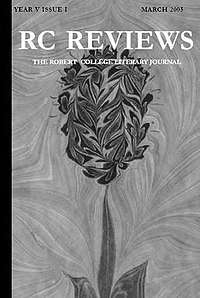
English
- Bosphorus Chronicle: The school's newspaper published quarterly (first published in 1959).
- Record: The Yearbook.
- Kaleidoscope: The English literature magazine.
Turkish
- Köprü (The Bridge): The school's Turkish newspaper, published bimonthly (first published in January 2009).
- Martı (Seagull): Turkish literature journal.
- Oda (Room): Turkish literature journal publishing poems, stories and photos submitted by students.
- Tarih (History): The History Club's annual publication.
- Sinek (Fly): The Film Review Club's annual publication.
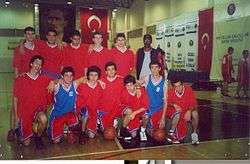
Conferences and festivals
Fine Arts Festival (FAF)
The Fine Arts Festival is the largest secondary school festival in Turkey. It has been held annually since 1982 by the Robert College Student Council. Each year, more than 2,000 people attend the festival, which is traditionally held in May. The festival is a big event in which many student groups can perform on stage. There are various art exhibitions and dance shows that also take place. Student Council members visit other high schools in Istanbul and advertise for this event. At the end of the festival, a well-known artist or band typically performs on stage. Most of the revenues used to fund this event are raised through food and ticket sales. Food vendors are usually selected by Student Council members and consist of restaurants close to Robert College such as "kumpir" sellers in Ortaköy. This promotes the tight-knit Robert College community spirit.[18]
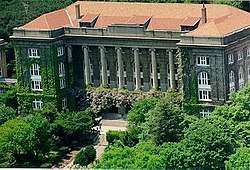
International Istanbul Youth Forum (IYF)
The International Istanbul Youth Forum is an annually held conference at Robert College. It has been organized every year since 2006 with participants from numerous European countries. Each year, more than 150 participants from all over Europe gather at the RC campus. The conference is organized by the Robert College European Youth Club.
Ethics Forum
The Ethics Forum is the first to be established at high school level in Turkey. Robert College Ethical Values Club organizes an ethics case study contest at national level among high school students, following their forum. The results are announced at the Ethics Conference near the end of the year. Both events attract more than twenty public and private schools from around Turkey.[19]
Robert College International Model United Nations (RCIMUN)
Robert College International Model United Nations (RCIMUN) is a THIMUN-affiliated Model United Nations conference organized annually by the Robert College Model United Nations Club (RCMUN) since 2006. The conference includes four General Assembly committees, those being the Political, Human Rights, Environment, and Disarmament Committees, a Special Conference committee, the Security Council of UN, an Advisory Panel, ECOSOC, Specialized Agencies (RCSA), the equivalent of two intertwined historical committees which simulate a single historical event, a separate Historical Security Council, as well as a simulation of the International Criminal Court. Approximately 750 students, of which about 42% were from international schools attended the 2012 conference.[20]
Istanbul Gençlik Forumu (IGF)
Istanbul Gençlik Forumu is a national conference where representatives from over 30 high schools from different regions come together to discuss issues regarding the future of Turkey. In 2008, the 5th IGF welcomed over 250 participants. Discussions about international affairs are held in Turkish and each committee is responsible for writing a resolution. Then, at the General Assembly, each resolution is discussed and voted on. It is also the National Selection Conference of EYP Turkey, which is also recognized by the international office of European Youth Parliament. The conference is held annually and is organized by the Robert College European Youth Club.
Turkish Theater Festival (TIFES)
Organized by the Robert College Theater Club, TIFES is one of the major theatrical events at high school level in Turkey. The festival takes place in Robert College campus during the first week of June. Numerous plays are put on stage during the week in Suna Kıraç Hall and famous actors, actresses and playwrights give talks on topics related to theatrical arts.[21]
Junior Achievement Robert College Conference (JARC)
Robert College Junior Achievement Club is hosting this event. About 300 Junior Achievement students from all over Turkey meet each other and share their experiences with others and famous entrepreneurs and artists related to the topics like Risk (2010), Alternative Careers (2009), Creating a Brand (2008). The entertaining workshop about these topics is a didacting icebreaking activity to strengthen the relationship between Junior Achievement students. The nearest conference is in April 2011.
Campus
The 65-acre (260,000 m2) wooded campus overlooking the Bosphorus is home to historic buildings as well as modern ones, centennial trees and a rich fauna, among which the Bosphorus Beetle, an endemic species to this campus, could be counted.
Major buildings
- Gould Hall: This building, the oldest educational building on the campus, is a gift from Helen Gould Shepard, daughter of the famous 19th century Wall Street financier Jay Gould. She donated US$150,000 for the construction, which began in 1911 and was completed in 1914. Today it houses classrooms, the main administrative offices, the İbrahim Bodur library, Heritage Room, and the RC Commons area, as well as the Turkish Literature and Social Sciences Departments.

- Mitchell Hall: Originally home to the school kitchens and dining room, the building was a gift from Miss Olivia E. Phelps Stokes, who donated US$100,000. A modest woman, she asked for the building to be named in memory of her friend, Sarah Lindlay Mitchell. Today, the building houses classrooms used primarily for Math lessons, the Math Department, the Sait Halman Computer Center, the audio-visual center, and two Multimedia Rooms (MMRs). The top floor is used for examinations, minor conferences, and weekly club sessions.
- Woods Hall: Completed in 1914, the building was a partial gift from Mrs. Henry Woods of Boston, who donated US$58,000, with Helen Gould Shepard supplying the remaining US$25,000 required. It was used as a Science Building until 1990, and today is home to classrooms used primarily for English lessons, two English department offices, and two college counselling offices.
- Sage Hall: A gift from Mrs. Margaret Olivia Sage, widow of Russell Sage, a famous 19th century financier and associate of Jay Gould, Sage Hall is one of the few buildings still used for its original purpose. A philanthropist, she donated US$100,000 for the building, built as a dormitory. Today, the building houses the girls' dormitories, infirmary, art studios and a darkroom.
- Bingham Hall: Originally built as a medical school building, financed by William Bingham in memory of his mother, Mary Payne Bingham, the building housed the junior high school section from 1925 to 1992. Today, it is home to the boys' dormitories, as well as a small conference room, business and administrative offices.
- Feyyaz Berker Hall: Feyyaz Berker Hall, which today houses the science labs and classrooms, as well as the Science Department, was completed in 1990, and named after its largest donor, leading Turkish businessman and Robert College Trustee, Feyyaz Berker (Robert College Eng '46 alumnus). Contents of the Biology Museum, which has one of the rarest collections in Turkey, is scattered around the second and third floors of the building.
- Suna Kıraç Hall: A state-of-the-art theater building completed in 1990, which includes a large stage, make-up rooms, modern sound and lighting system and seatings for 512 people, was named after its largest donor Suna Kıraç (American College for Girls '60 alumnus), a leading Turkish businesswoman and Robert College Trustee. Its basement houses the music department and several music rooms.
- Nejat Eczacıbaşı Hall: The modern school gymnasium was opened in 1990 and named after its largest donor, prominent Turkish bio-chemist and businessman Dr. Nejat Eczacıbaşı (Robert College '32 alumnus). Its basement houses the Multi-Purpose Room (MPR).
İbrahim Bodur Library
When founded in 1863, Robert College had four students. A sum of $2,120 had been allocated to the library, and Harvard University had donated 200 volumes for the opening of the library. During the 1950s and '60s, the college had one of the largest collections in Turkey. (In 1957: 111,598 books and 214 periodicals; the American College for Girls Library 27,163 books and 108 periodicals, according to the Turkiye Kütüphaneleri Rehberi (Turkish Libraries Guide) published by the Turkish National Library that year. After the foundation of Boğaziçi University, the college donated the majority of its collections to the newly founded university. Today, Robert College has the largest library collection among secondary schools in Turkey. The library houses more than 47,300 books, 190 periodical publications, and two web-based databases. It occupies an area of 700 square meters, with a seating capacity of 90, and serves a total of 927 students, as well as all the employees and alumni of the school on second and third floors of Gould Hall.[22]
Other buildings and facilities

- The Rodney B. Wagner Memorial Maze
- Murat Karamancı Student Center (MKSC)
- Dave Phillips Field
- Tennis courts
- Basketball courts
- Faculty housing (Barton House, White House, Yalı, Guest House, and numerous other houses dispersed on campus)
- Biology Pond
- The Bridge and Security
- Forum
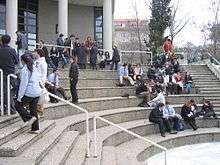
This section only includes the buildings on today's Robert College campus (formerly the campus of American College for Girls); the ones on the former boys campus of Robert College can be found in the Boğaziçi University article.[23]
Tuition and financial aid
Robert College tuition fees in the 2020–2021 academic year[24] are:
| Day Student | Boarder (5 days) | Boarder (7 days) |
|---|---|---|
| TRY 109,000 | TRY 149,300 | TRY 167,770 |
| US$14,750 | US$20,235 | US$22,735 |
Tuition fees are adjusted each year according to the inflation rates in a limited range set by the Ministry of Education. Robert College has been the most expensive private school in Turkey over the years. It is still the most expensive educational institution, surpassing some private universities.[25] According to school data, 26% of students received financial aid for the 2019-2020 academic year.[26]
Notable alumni
Since the time of the Ottoman Empire, Robert College alumni have played a leading role in numerous fields including the arts, academia, science, engineering, business, civil society and government administration.[27] Garnett stated in her 1904 publication that "since its foundation forty years ago many of its graduates have attained to high positions in the Governments of the Balkan principalities, and otherwise distinguished themselves."[13]
In 1990, three alumni, Nejat Eczacıbaşı, Suna Kıraç and Feyyaz Berker donated the necessary funds for the construction of the new buildings that are mentioned in the Buildings section. An annual giving campaign raises funds for the school, as costs cannot be met by tuition fees alone. The development office publishes the RC Quarterly, which reaches 10,000[28] Robert College alumni around the world online and by mail.
Bizimtepe, a cultural and recreational center next to the campus, is an affiliate of the Alumni Association.
Notable faculty (former and current)
- Cahit Arf, mathematician
- Calouste Gulbenkian, entrepreneur and art collector
- Behçet Kemal Çağlar, poet
- John Freely, Professor of Physics, author
- Mebrure Gönenç, one of the first female members of the Turkish Parliament (alumna of the American College of Girls)
- Frances Harshbarger, one of the first female American mathematicians to receive a doctorate
- Necip Fazıl Kısakürek, poet and author
- Paul Lange, conductor of the Ottoman Empire's Royal Orchestra, musician, father of US conductor Hans Lange
- M. M. Mangasarian, Armenian-American atheist and secularist intellectual
- Arman Manukyan, Professor of Economy and Accounting
- Mihri Pektaş, one of the first female members of the Turkish Parliament (alumna of the American College of Girls)
- Dave Phillips, Physical Education teacher, played professional basketball for Beşiktaş JK
- Mary Paton Ramsay, literary scholar[29]
- Friedrich Schrader, German journalist and author
- Karl von Terzaghi, Austrian civil engineer, known as the "father of soil mechanics and geotechnical engineering"
See also
References and notes
- The Turkish education system divides schools into two classes: public or private. According to this classification, Robert College is a private school.
- "Türkiye Geneli En iyi Özel Okullar Taban Puanı" [Best Private High Schools Nationwide, Threshold Scores]. Archived from the original on 25 March 2007. Retrieved 24 March 2007.
- This title is also claimed by the American College of Sofia, founded in 1863.
- J. D. B. (1910). "Bulgaria". The Encyclopaedia Britannica; A Dictionary of Arts, Sciences, Literature and General Information. IV (BISHARIN to CALGARY) (11th ed.). Cambridge, England: At the University Press. p. 779. Retrieved 2 September 2018 – via Internet Archive.
- Friedrich Schrader in: Robert College, Nord und Süd, November 1919, S. 165–169 (Article in German language)
- "Christopher Robert's Will" (PDF). The New York Times. 27 November 1878. Retrieved 22 January 2008.
- "George Washburn" (fee, via Fairfax County Public Library). Dictionary of American Biography. New York: Charles Scribner's Sons. 1936. GALE|BT2310001134. Retrieved 2012-02-26. Gale Biography In Context. (subscription required)
- "About Robert College". Archived from the original on 22 February 2012. Retrieved 7 February 2012.
- "Chronology of Events". Archived from the original on 3 February 2007. Retrieved 8 February 2007.
- "Story of Robert College" (PDF). Archived from the original (PDF) on 20 June 2007. Retrieved 24 March 2007.
- "New Faculty Recruitment Page". Robert College. 1999-01-29. Retrieved 2019-06-02.
- "FACT SHEET 1998–1999". Robert College. 1999-01-28. Retrieved 2019-06-02.
- Garnett, Lucy Mary Jane. Turkish Life in Town and Country. G.P. Putnam's Sons, 1904. p. 204-205.
- "The School and Students". Retrieved 8 January. Check date values in:
|accessdate=(help) - "Summary of Faculty Compensation for Foreign Faculty During Academic Year 1999–2000". Robert College. 1999-04-23. Retrieved 2019-06-02.
- "RC'06 University Results". Archived from the original on 3 July 2007. Retrieved 23 March 2007.
- "RC'11 University Results". Robert College. Archived from the original on 2012-02-15. Retrieved 2012-02-26.
- "Fine Arts Festival-Güzel Sanatlar Festivali". Archived from the original on 2007-04-03. Retrieved 8 February 2007.
- "RC Ethical Values Club". Retrieved 23 March 2007.
- "Robert College International Model United Nations". Retrieved 23 February 2011.
- "TIFES IV" (in Turkish). Archived from the original on 2007-10-15. Retrieved 23 March 2007.
- "About Robert College Library". Archived from the original on 29 December 2006. Retrieved 6 February 2007.
- "Robert College, 1863–1971; Bosphorus University, 1971–Present" (PDF). Archived from the original (PDF) on 20 June 2007. Retrieved 6 February 2007.
- Okul Ücretleri Tablosu, 2020-2021
- "Milliyet (National Daily Milliyet's Online version)". 2006. Retrieved 24 March 2007.
- "Mali Yardım". 2016. Retrieved 25 November 2016.
- "History of Robert College (Excerpt from Celebrating the Past 1863, Building the Future 1988)". 2006. Archived from the original on 3 July 2007. Retrieved 6 February 2007.
- "RC Quarterly". Archived from the original (PDF) on 15 June 2007. Retrieved 14 February 2007.
- "University News", The Manchester Guardian, 22 December 1919, p. 4.
- "History | IICS Istanbul International Community School | About Us". IICS. 2018-04-06. Retrieved 2020-01-28.
Books on Robert College
- Ali Neyzi, Alma Mater and the Story of Robert College
- Asya Orhon, Kolejlerin Koleji, Robert Kolej
- Betty Tank, Pushing My Shadow
- Caleb Frank Gates, Not To Me Only, Princeton, 1940.
- Cyrus Hamlin, My Life and Times, Boston, 1893.
- Cyrus Hamlin, Among the Turks
- Eren Yanık, Akvaryum
- Washburn, George (1909). Fifty Years in Constantinople and Recollections of Robert College (1 ed.). Boston & New York: Houghton Mufflin Company. Retrieved 3 April 2016. via Internet Archive
- Hester Donaldson Jenkins, An Educational Ambassador to the Middle East
- John Freely, History of Robert College, Istanbul, YKY, 2000.
- Lynn Scipio, My Thirty Years in Turkey, New Hampshire, Ringde, 1955.
- Mary Mills Patrick, A Bosphorus Adventure, London, 1934.
- Mary Mills Patrick, Under Five Sultans
- May Fincancı, The Story of Robert College Old and New
- Moris Farhi, Young Turk
- Orhan Türker, Mega Revma'dan Arnavutköy'e, Istanbul, 2005
- Stevens Marcia & Malcolm, Against the Devil's Current: Life & Times of C.H.
- Talat S. Halman, Aklın Yolu Bindir, Istanbul, 2003.
- Ugur Ersoy, 1950–55 Erguvan Renkli Yıllar, Istanbul, 2004.
External links
| Wikimedia Commons has media related to Robert College. |
- Finding aid to the Robert College papers at Columbia University Rare Book & Manuscript Library
- Robert College
- Robert College Alumni Association
- Robert College Alumni Association of America
- The Student Council
- Fine Arts Festival
- RC Quarterly Robert College Alumni Magazine
- Robert College International Model United Nations Website
- Robert College EYC Website
- about Robert College
- RC Quarterly
- "History of Boğaziçi University". Boğaziçi University. Retrieved 2012-02-27.